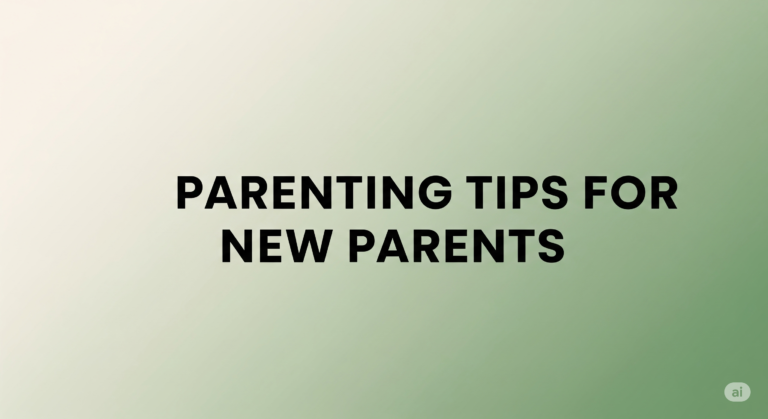Becoming a new parent is an exciting yet challenging journey. From handling a newborn’s cries to preparing your child for their first day at school, parenting can feel overwhelming. Don’t worry! This guide shares parenting tips for new parents to make the transition smoother, using simple strategies to nurture your child’s growth from infancy to the classroom. These tips are beginner-friendly and packed with new parent advice to help you thrive.
1. Understand Your Newborn’s Needs
Newborns communicate through crying, and decoding those cries is one of the first newborn care tips you’ll learn. Babies cry for reasons like hunger, discomfort, or needing a diaper change. Here’s how to handle it:
- Feed on Demand: Newborns need feeding every 2-3 hours. Breastfeeding or formula feeding, ensure your baby is comfortable and full.
- Create a Routine: A consistent schedule for feeding, sleeping, and playtime helps your baby feel secure.
- Swaddle for Comfort: Swaddling mimics the womb’s coziness, calming your baby during fussy moments.
Pro Tip: Keep a journal to track your baby’s feeding and sleeping patterns. This helps you identify their needs faster.
2. Prioritize Sleep (For Both of You!)
Sleep deprivation is a common struggle for new parents. Baby sleep tips are essential to ensure both you and your baby get enough rest.
- Establish a Bedtime Routine: A warm bath, soft lullaby, or dim lights signal bedtime.
- Safe Sleep Practices: Always place your baby on their back to sleep to reduce the risk of SIDS (Sudden Infant Death Syndrome).
- Nap When They Nap: Take short naps during the day to recharge your energy.
Lack of sleep can affect your mood and health, so don’t hesitate to ask for help from family or friends.
3. Build a Strong Bond with Your Child
Bonding is key to your child’s emotional development. Parenting advice for beginners often emphasizes creating a loving connection early on.
- Skin-to-Skin Contact: Hold your baby close to promote trust and security.
- Talk and Sing: Your voice soothes your baby and encourages early language skills.
- Play Together: Simple games like peek-a-boo stimulate your baby’s brain and strengthen your bond.
These moments lay the foundation for a confident and happy child.
4. Prepare for Toddler Tantrums
As your baby grows into a toddler, tantrums may become a challenge. Toddler parenting tips can help you manage this phase:
- Stay Calm: Respond with patience to avoid escalating emotions.
- Set Clear Boundaries: Simple rules like “no hitting” teach discipline without overwhelming your child.
- Distract and Redirect: Offer a toy or activity to shift their focus during a meltdown.
Consistency is key. Toddlers thrive on predictable routines and clear expectations.
READ MORE:Alphabet Letter Tracing (A-Z) Set Of Worksheets
5. Encourage Early Learning
Preparing your child for the classroom starts early. Early childhood education begins at home with activities that spark curiosity:
- Read Daily: Storytime builds vocabulary and imagination. Choose colorful picture books to keep them engaged.
- Sing Nursery Rhymes: Songs improve memory and language skills.
- Explore Through Play: Puzzles, blocks, and drawing enhance motor skills and creativity.
These activities make learning fun and set the stage for school readiness.
6. Take Care of Yourself
Self-care for new parents is just as important as caring for your child. Parenting can be stressful, so prioritize your well-being:
- Eat Healthy: Nutritious meals keep your energy levels up.
- Stay Connected: Talk to other parents or join a parenting group for support.
- Take Breaks: Even a 10-minute walk can refresh your mind.
A happy parent raises a happy child, so don’t neglect your mental and physical health.
Read More: 5 Gentle Parenting Techniques Every Mom Should Try
7. Seek Support When Needed
You don’t have to do it alone. Parenting support for new moms and dads is available through:
- Parenting Classes: Learn practical skills from experts.
- Online Communities: Forums and social media groups offer tips and encouragement.
- Pediatricians: Regular check-ups ensure your child’s health and development are on track.
Don’t hesitate to ask questions or seek advice—it’s a sign of strength, not weakness.
8. Plan for the Classroom Transition
When it’s time for preschool or kindergarten, preparation is key. School readiness for kids involves:
- Social Skills: Encourage sharing and taking turns during playdates.
- Basic Skills: Teach your child their name, colors, and numbers through fun activities.
- Visit the School: Familiarize your child with their new environment to ease first-day jitters.
A positive attitude about school helps your child feel excited rather than anxious.
Parenting is a marathon, not a sprint. From soothing a crying newborn to preparing your child for their first classroom experience, these parenting tips for new parents will guide you every step of the way. Embrace the journey with patience, love, and a willingness to learn. You’ve got this!




